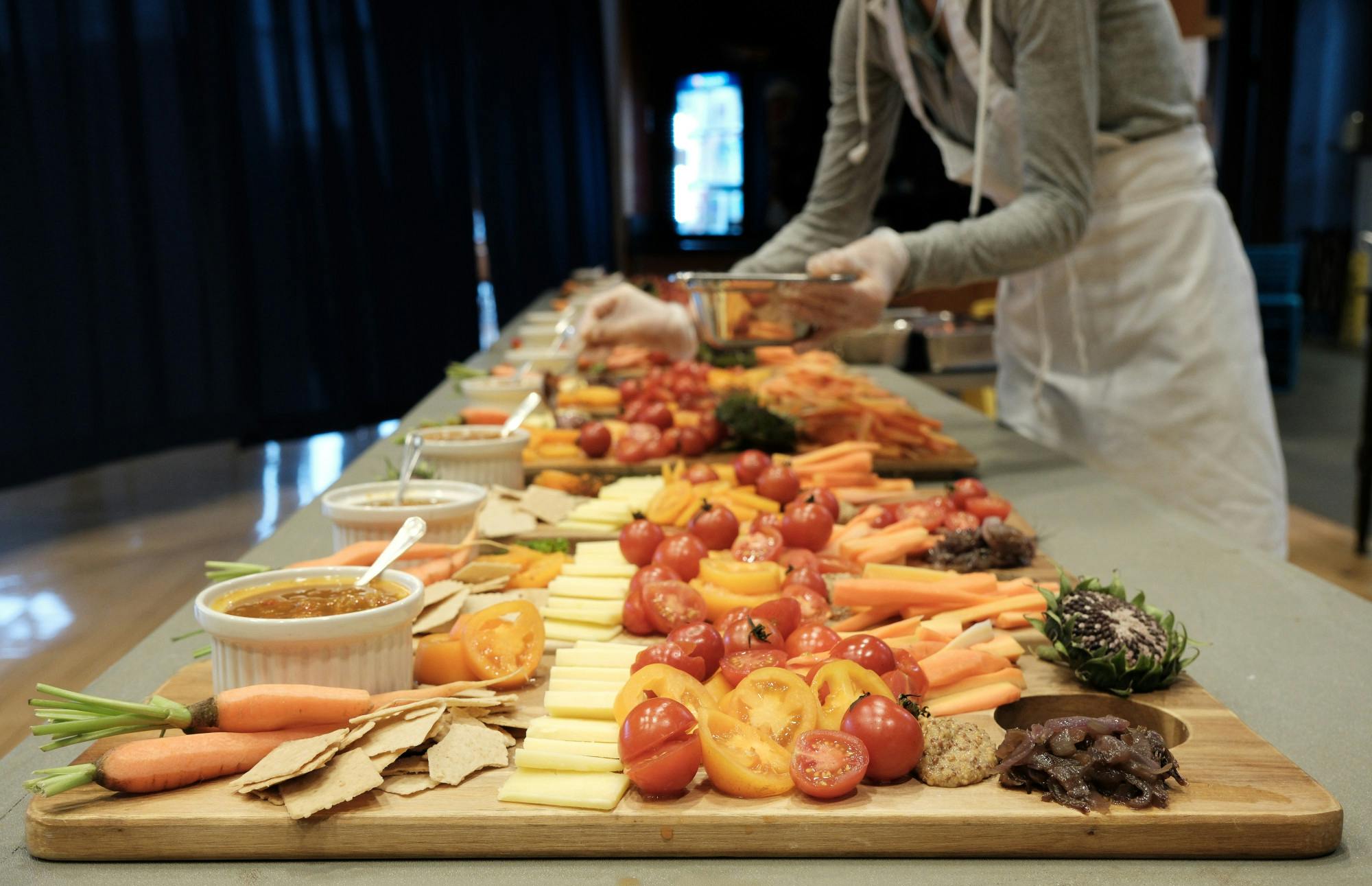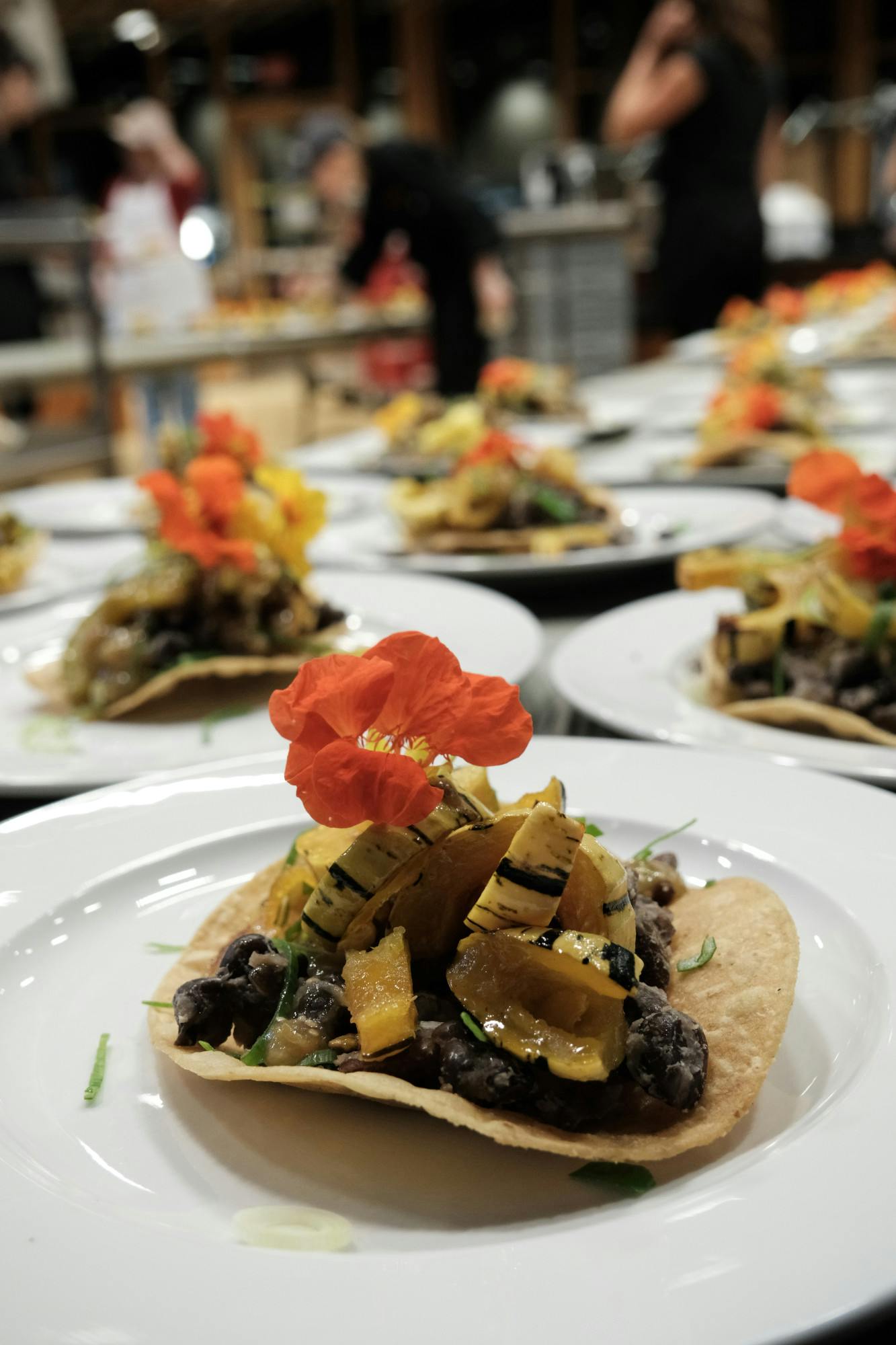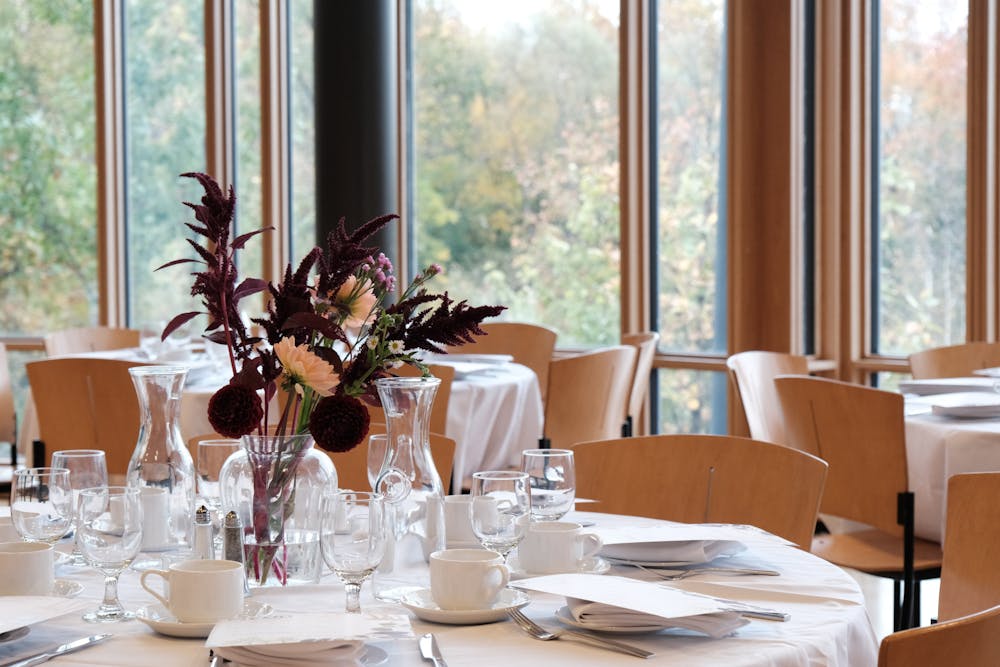This past Friday’s Dolci dinner, cleverly coined “Knolci,” merged two Middlebury favorites: Dolci, Middlebury’s student-run restaurant, and the Knoll, the college’s farm. The Knoll’s bountiful harvest served as the inspiration for the event and provided most of the meal’s produce, which Dolci chefs used to craft a vibrant and creative five-course meal. The occasion brought together students, collaborators and supporters of the Knoll to celebrate the site’s twentieth anniversary and a successful fall harvest.
The process of creating any Dolci dinner begins well before Friday. In the case of “Knolci,” a collaboration between Dolci and the Knoll had been dreamed of since before the Covid-19 pandemic. Then, about a year ago, soon-to-be Dolci Head Chefs Zoe Gieger ’25 and Sophia Giliberto ’24 brought the dream to reality and initiated planning. In January 2023, Gieger and Giliberto worked with Winter Term Knoll-focused Independent Study students and Associate Director of the Knoll Megan Brakeley ’06 to look through the season’s seed order and begin thinking about what would be available for an early-October harvest.
During the spring and summer, the team continued developing a menu, a process that required flexibility because of this summer’s unpredictable weather.
“Given the extreme weather challenges of this growing season (early season heat, followed by record-setting rainfall totals, thunderstorms, and extremely buggy conditions) they were also able to adapt the menu last-minute. For example, our cabbage and kohlrabi didn’t mature in time, but the watermelon radish (with a little pickling to coax the flavors out) harvest was perfect,” Brakeley wrote in an email to The Campus.

Gieger, who was also one of the Knoll’s summer interns, said that throughout the planning process, the event coordinators paid close attention to the types and quantities of crops that the Knoll normally donates to Helping Overcome Poverty’s Effects’s (HOPE) so that Knolci would not be using crops or resources that would be more needed at HOPE’s food shelf.
In the weeks leading up to the dinner, the chefs finalized the menu and began sourcing and preparing food. Ingredients that could not be harvested from the Knoll were purchased from Addison County Relocalization Network’s food hub, the Middlebury Natural Foods Co-Op or were available at Atwater Dining Hall.
During the final week leading up to the dinner, Dolci prep chefs come into Atwater every day to chop, mix and marinate ingredients in anticipation of the big day.
Securing a coveted seat at any Dolci dinner is, without fail, a competitive frenzy. Dolci’s email list comprises over 300 students, ranging from dining hall loyalists to the most pretentious of student food critics. The Tuesday evening before each dinner, Dolci sends out a Google Form, which is open to submissions for a mere fifteen minutes. Within the hour, a fortunate few (this time 22 students) are randomly selected as lottery winners and are sent two tickets. In the few short days before Friday, lottery winners must carefully choose a plus-one to fill their sought-after seat.
On Friday, Oct. 6, this round’s roster of guests gathered in the entrance to Atwater Dining Hall for their highly anticipated feast. Given the lack of a dress code, Knolci attire ranged from black-tie formality to farm-ready casualness. This week’s event also saw multiple bolo ties, perhaps a formal take on this dinner’s rustic-agricultural focus. Dolci servers led guests to their seats, where they joined friends and strangers at the dining hall’s typical round, eight-person tables, which were elevated for the evening of fine dining by candles, crisp tablecloths, menus designed by Charlotte Xu ’26.5 and bouquets of flowers that were harvested from the Knoll on Friday morning.
The first dish to appear from the kitchen was an assortment of snacks including tomatoes, crackers, cheese, tomato jam, pickled carrots and mustard, made by Brakeley, served family-style on a wooden board. As guests grazed, Brakeley and Knoll summer interns Cassia Park ’24.5, Aisha Thapaliya ’25.5 and Sheila Camacho ’25 gave an introduction to the meal and the preparations that went into it.
Next up was pickled watermelon radish with miso honey butter on crostini. Offering perhaps the most complex flavor palette of the night, the miso honey butter artfully combined the umami of miso with the creaminess of butter and sweetness of honey in a couple of exciting bites. Topped with vibrant watermelon radish and garnished with edible flowers, the crostinis were nearly as beautiful to look at as they were amazing to taste.
Beginning the bulk of the meal, servers then brought out family-style kale salad with honey pistachio dressing, apples and crunchy kale chips on top. From the start of Knolci’s planning stages, Gieger and Giliberto were set on incorporating a kale salad into the menu. Gieger was particularly excited about the pistachio dressing, she said, because she felt like it had the potential to change peoples’ minds about kale’s slightly bitter taste. Curly and red russian kale varieties made up the base of the salad, and garnished with edible flowers, the salad was a visual representation of the rows of flowers and leafy greens that greet visitors to the Knoll.
Gieger also highlighted that the choice to include multiple family-style dishes in the meal was more intentional than it may seem. At each step of the meal, Knolci coordinators made a conscious effort to embody the Knoll’s focus on climate resiliency and food relocalization, and choosing family-style dishes over single portions played a large role in their effort to do so.
“We tried to do more family-style courses than we usually would do in a meal to reduce food waste, instead of portioning out on plates and having leftovers that way, trying to have people just take what they want, and then other people can take more if they want. Also with doing that, you reduce dish waste and the energy it takes to run that,” Gieger said.
The kale salad was followed by winter squash and bean tostadas topped with tomatillo sauce, caramelized onions and a side of serrano peppers. The dish was meant to highlight tomatillos and delicata squash, which are some of the Knoll’s highlight crops from year to year.

A crowd favorite of the night was the final plate before dessert: beet gnocchi with sage-and-lemon-verbena-infused brown butter and local goat cheese. The mildly earthy flavor of the beet gnocchi was complemented by the creamy yet tangy goat cheese, and the texture of the chewy, moist gnocchi was balanced by the chèvre’s velvety taste, giving the dish a warm and comforting feel.
Finally, guests who saved room for dessert were treated to olive oil cake with basil ice cream and honey whipped cream or a vegan alternative, red perilla granita. The subtly sweet cake, saturated with olive oil, paired well with the fresh, crisp flavors of the basil ice cream, leaving its consumers dreaming of the dish for the rest of the night. Attendees were also offered a small cup of lemongrass and mint tea, a calming, yet refreshing end to a flavorful night.

After dinner, Dolci cleanup often produces a considerable amount of waste. Even after staff eat their share of the food and take home leftovers, there is still food wasted from unfinished portions and overestimated quantities. At last week’s event, Knolci staff sent food to Weybridge House, Middlebury’s special interest house focused on local food, so that minimal prepared food went to waste.
Reflecting on the event, Brakeley emphasized the feeling of interconnectedness it inspired.
“Knolci was a culminating celebration of experiential learning, connection across the college, and drawing on the strengths of student-powered learning here — in the most delicious and interconnected way,” said Brakeley.
Knolci guests undoubtedly agree that the dinner was a strong testament to the culinary ingenuity and agricultural skill of the Middlebury community, and it was a privilege to witness such a powerful collaboration between two of Middlebury’s beloved entities. Perhaps Knolci’s most powerful takeaway, however, is its vision of a relocalized, regenerative and climate-conscious food system, which it presented in a resoundingly appetizing way.

Maggie Bryan '25 (she/her) is the Senior News Editor.
Maggie is a senior at Middlebury, majoring in Environmental Policy and French. She previously held roles as Senior Arts and Culture Editor, Arts and Culture Editor, and Staff. During her free time, she loves running, listening to live music, drinking coffee, and teaching spin classes. She is from Chapel Hill, North Carolina.




